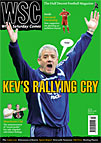 Phil Ball has had some dodgy encounters from Grimsby to Spain
Phil Ball has had some dodgy encounters from Grimsby to Spain
My encounters with footballers got off to a bad start. Back in the Jurassic period, when players were still awarded testimonials for ten years’ service (they would now simply be accused of being unambitious), Grimsby’s goalkeeper Harry Wainman was fortunate enough to count on the presence of one Frank Worthington for his particular bash, invited to play because his less famous brother, Dave, was Grimsby’s full-back at the time. I was 15, and had just bagged Worthington’s sister (Julie) as my girlfriend. It still remains my only achievement in life.
On the day of the match, I was invited up to the Worthingtons’ mum’s house to meet the gathering, including Bob, who played for Notts County. The great Frank was there, with his Swedish wife and small baby. I don’t know why I said it, but “Frank” seemed too familiar somehow, and “Mr Worthington” sounded plain daft. It just came out of my mouth, and I’ve always regretted it, but as I walked into the room and he acknowledged my presence I mouthed the ludicrous phrase “Hello sir”. I hope he didn’t hear me.
Over the years I’ve lived in Spain, things failed to improve. When I was in Huelva, in Andalucia, researching my book Morbo, I bumped into Gica Craioveanu, then a Romania international playing for Villarreal and now a commentator for TV channel La Sexta. The team were staying in the same hotel as me, and we were both in the bar one lunchtime. I knew him from his Real Sociedad days, when he’d shared the same bread shop as me in San Sebastian. Every time I’d gone in for my morning loaf, he’d always been there, chatting up the blonde behind the counter. “What are you doing here?” he asked, surprised to see me in deepest Andalucia. I was kind of chuffed that he remembered me. “I’m coming to your game with Huelva this afternoon,” I said.
And then I ventured: “I bet you miss that blonde, eh? From the baker’s shop,” winking at him and making the appropriate gestures. His face fell. “Yep – I do,” he answered. “She’s dead. Died of blood poisoning last month. I went up to her funeral.” There’s not really a lot you can say in response to that.
A couple of years later, I went to the Bernabéu to interview the legendary Alfredo Di Stéfano, who was by then well into his grumpy pensioner stage. His secretary had set up the tryst, and I was to meet him in the Veteranos bar in the stadium. I flew down to Madrid the same morning, and at the appointed time walked into the bar. The world’s greatest ever player was sitting hunched in a scruffy old jacket, watching the TV. I approached him with care.
“Don Alfredo,” I began (I’d been told to use this form of address), “my name’s Phil Ball. We arranged to talk, for my book.”
Without so much as looking up from the TV, he replied, in his best Argentine tones: “You might have arranged it, but I haven’t.”
Taken slightly aback by this, I tried to appeal to his sense of charity. “But Don Alfredo,” I began, “I’ve flown down this morning from San Sebastian.”
At this, the great man turned around to face me. “San Sebastian?” he grinned, his teeth yellow and his face all puckered with wrinkles. “San Sebastian? Well I’m from fucking Patagonia!” and he pointed to the door. I’m still not sure what he meant, but it was the end of the interview.
Living close to the NH hotel in San Sebastian, where the visiting players tend to stay, has also yielded some regular encounters over the years. Nipping out for an early-morning jog one Sunday, I found myself approaching about half a dozen of the Valencia squad on the empty promenade. As I drew close, Spanish international Rubén Baraja stepped out from the group and flagged me down. “Anywhere we can get a coffee around here, mate?” he asked. They were all flushed and splendid in their shiny tracksuits.
“Well, you could try that one over there,” I suggested, pointing to a small hotel further down the prom. “But they’re big Real Sociedad fans. You might not get served,” I quipped, assuming they would like a bit of banter.
Baraja looked back to his team-mates, with a deal-with-standard-dickhead-response expression on his face. “So why don’t you come with us?” he suggested. “You could introduce us all.”
I thought about it for a moment. It was like some sort of dream. As I was about to agree, goalkeeper and philosopher Santi Cañizares suddenly piped up: “Hey Rubén. Have you got any money? Cos I haven’t got shit,” upon which there was a general murmur of agreement that none of them had a euro between them, despite the fact that each one earned in excess of a million quid a year.
“Oh well, next time,” I waved, and jogged off down the prom. That day they won 2-0, but I don’t know if that was significant.
From WSC 253 March 2008